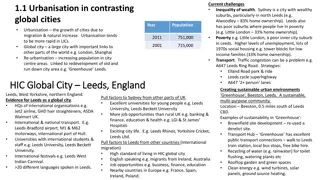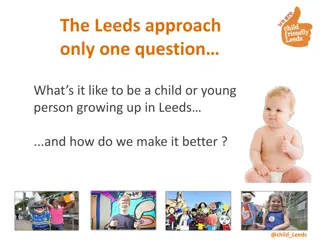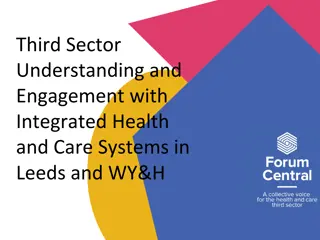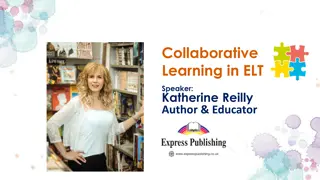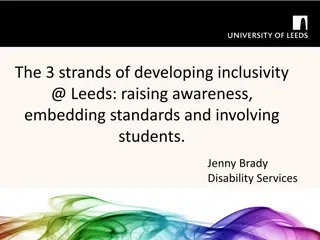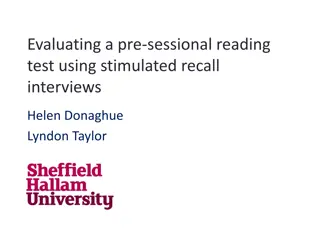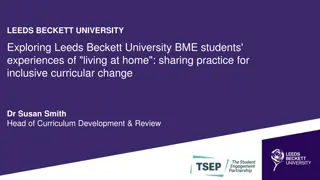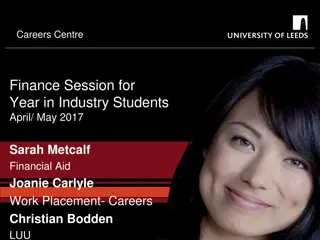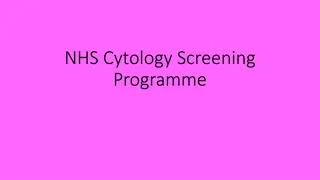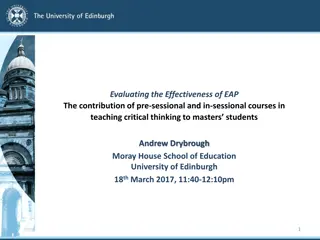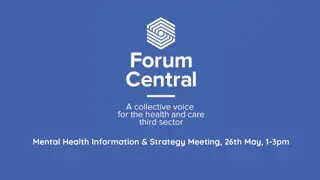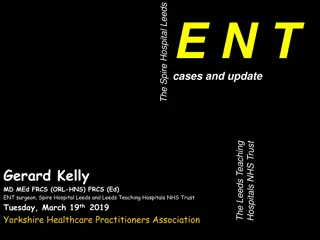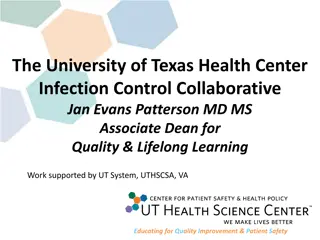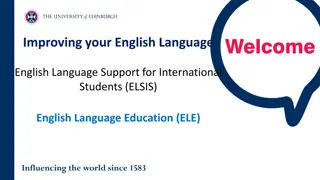Collaborative Development Through a Content-Based Pre-Sessional Programme at University of Leeds
This project at the University of Leeds analyzed and implemented a content-based pre-sessional programme across various faculties, aiming to better understand and promote Principled Pragmatism. The initiative spanned 15 months, involving significant academic input and the launch of new programmes. Program strands focused on different fields, with an emphasis on emerging dialectics like Pragmatism, Idealism, and Analytical Themes. The project highlighted themes of adaptation, representation, and engagement within an academic setting.
- Collaborative Development
- Content-Based Programme
- University of Leeds
- Pre-Sessional
- Academic Initiative
Download Presentation

Please find below an Image/Link to download the presentation.
The content on the website is provided AS IS for your information and personal use only. It may not be sold, licensed, or shared on other websites without obtaining consent from the author. Download presentation by click this link. If you encounter any issues during the download, it is possible that the publisher has removed the file from their server.
E N D
Presentation Transcript
A combined offer: collaborative development through a content- based pre-sessional programme Bee Bond & Melinda Whong University of Leeds
Overview Background: Content-Based Pre-Sessional Project Analysis: Based on framework from social policy work Aim: i) To better understand how it was possible ii) To promote what we have come to understand as: Principled Pragmatism
Background: 2015 - 2016 University of Leeds 9 Faculties 242 taught postgraduate programmes mapped onto one of nine new content-based Pre- Sessional course strands
Timeframe: 15 months from inception April 2015: Change in English language restrictions (SELT) Pro-Vice Chancellor Student Education 9 Pro Deans Funding from University Executive Group Academic Working Group Chaired by LC Director All Faculties represented All levels from Pro-Dean to MA programme leader Operations Group Project Manager from Strategy and Planning Heads of: Admissions, Finance, QA, Student Education Services, International Office, Marketing Summer 2016: 9 new six-week programmes launched
Course Development: Academic Input Input for course development: [Equivalent of] 3 lectures with Reading Lists Consultation on formative/summative assessment task design Input in summer: Delivery of lectures Aug Sept [Equivalent of]: for Science = lab sessions
Programme Strands Students Faculties 1 Language for Marketing 220 2 Language for Economics and Finance 110 1 3 Language for Human Resources Management 93 4 Language for Management and Enterprise 197 5 Language for Arts and Humanities 56 1 6 Language for Communications and Society 160 1 7 Language for Law & Society 31 1 (2 different Schools) 8 Language for Education 45 9 Language for Science 183 5
Emerging dialectic: Pragmatism Idealism Analytical Themes Organisation/Institutional parameters Intersubjectivity: adjustments, engagement and identity Experience: adapting to change/ questioning purpose Representation: and perception (Yuval-Davies 2006; Edwards, 2015)
Organisation Pragmatic integrated offer Title: Language for Faculty lines But: 4 in Business School One (huge) STEM strand Idealistic Embedded/discipline-specific (Hyland, 2002, 2004; Wingate, 2015) Student Education at the heart Discipline-oriented to allow interdiscipline choices E.g. Music and Management University s strategic plans: Internationalisation TEF preparation
Programme Development Planning Nov -Feb May - June Feb - May Timeline Vision Objectives Outcome July - Sept Sept - Plan successfully implemented & reviewed Review literature Programme Leader meeting: Assessment criteria Implement project plan Review of risks & issues Risks & issues effectively managed Review of risks & issues Development of 9 (18) content- based pre-sessional programmes Develop & submit Programmes for QA Lessons learned Design & execute curriculum/ syllabus Review & complete plan Programmes designed and delivered Planning Consult critical friends: external / internal Monitor & review plan Programme Leader meeting: curriculum design & LOs Create & disseminate effective T&L materials Review & evaluate syllabus Construct & implement a teacher development plan Assess Risk & Issues Evaluate and report on project Effective materials designed Run programmes Meet academic leads Effective teaching takes place/ developed understanding of EAP Observe content classes Meet academic leads Review & evaluate materials Generated external interest/ ideas for further development Use materials in class/ review and feedback from teachers and students Review Analyse academic content for EAP exploitation effectiveness of development plan Write up/ present at conferences Develop further programmes Receive academic content Plan syllabus Programme Development Observe classes Design learning materials encourage further scholarship projects Run induction sessions Review current materials & curriculum LITE Project Create teacher induction resources Work with academic lead on lecture content Language Teaching Forum: Alternative assessments Language Teaching Forum: What is EAP? Begin teacher recruitment: up to 70 Programme plan to external reviewer Create TD plan internal/ external speakers Programme Approval Grou Dissemination & Reporting Teacher knowledge development Knowledge resources
Intersubjectivity Intersubjectivity within the Language Centre Pragmatic General Learning Outcomes (iteration of year-round pre- sessional) Shared Assessment Criteria Modular approach Programmes take previous pre- sessional materials as a starting point Idealistic Shared and developed understanding of EAP Greater alignment with University practices Shared and developed understanding of HE context Sharing and valuing of different areas of expertise
Intersubjectivity Intersubjectivity outside the Language Centre Pragmatic Already had a bespoke pre- sessional Designated time for academic buy-in (Language Centre and Schools) How to balance the syllabus? What do we value? Why? Idealistic (Do)we understood what we were doing?! Tandem; collaborative approach to teaching Questioning of our purpose opportunities for scholarship
Experiential Pragmatic 1a. Coping with the content 2a. Maintaining authority in the classroom 3a. Workload and timetabling 4a. Supporting students towards assessment Idealistic 1b. Coping with the content 2b. Developing Academic Authority and agency 3b. Developing collaborative working practices 4b. What are we assessing?
Experience of shifting identity It s the first time (and this is my sixth pre-sessional) that I have seen the transition between pre-sessional and master s course. It made all the hard work seem really worthwhile. I also seem to have had a kind of conversion about the content. Having been resistant to it at first (I blame Bourdieu), I found the work on identity absolutely fascinating and also personally relevant. You might think that I would want to switch off when the course finished, but actually I had a long discussion with my son about it all, and ended up recommending that he read Bourdieu! (LC6; 13/9/16)
Representation Higher profile = more scrutiny Affordances for LC, students and University Pragmatic sustainable approach to effective teaching as increase in international students LC within University QA Language as part of Uni QA Idealistic LC and wider in two-way sharing of expertise: linguistic and international student-orientation Contra othering Inclusion as widely interpreted
Conclusion Conclusion Value of collaboration Breaking down barriers Reducing the othering that can occur if LC is on the margins Becoming equal partners in the academy Developing sense of academic identity Principled Pragmatism
Acknowledgements LC Colleagues, and in particular: Alison Leslie, Angela Hulme, Catherine Macbean, Cheryl Greenlay, Christopher Pajak, Deak Kirkham, Gary Hernandez, Jane Brearley, Jane Templeton, Jenna Bodin-Galvez, Jennifer Hirst, Jeremy Bradford, Kerri Freeman, Laura Foster, Monica Facchinello, Natasha Rust, Niamh Mullen, Peter Matthews, Sara Montgomery Thank you Bee Bond b.bond@leeds.ac.uk Melinda Whong m.whong@leeds.ac.uk
References References BALEAP (2008) Competency framework for teachers of English for academic purposes. Retrieved from http://www.baleap.org/wpcontent/uploads/2016/04/teap-competency-framework.pdf BALEAP. (2014) TEAP: Accreditation Scheme Handbook. Available: https://www.baleap.org/wp-content/uploads/2016/04/TEAP-Scheme-Handbook- 2014.pdf Bruce, I (2011) Theory and concepts of English for Academic Purposes. Basingstoke Palgrave Macmillan. Bruce, I. (2008) Academic Writing and Genre: A systematic analysis. London, Continuum. Butcher, C, Davies, C & Highton, M (2006) Designing learning: from module outline to effective teaching London, Routledge. Ding, A & Bruce, I (forthcoming) The English for Academic Purposes Practitioner: operating on the margins of academia Basingstoke Palgrave Macmillan. Edwards, Lee (2015) Power, Diversity and Public Relations Abingdon, Routledge. The Higher Education Academy (2014) Internationalising Higher Education Framework. Available: https://www.heacademy.ac.uk/system/files/resources/internationalisingheframeworkfinal.pdf Hyland, K. (2002) Specificity revisited: how far should we go now? English for specific purposes, 21, 385-395. Hyland, K (2004) Disciplinary discourses: social interactions in academic writing. Ann Arbor, University of Michigan Press. Kumaravadivelu, B. (1994) The Postmethod Condition: (E)merging Strategies for Second/Foreign Language Teaching TESOL Quarterly, Vol. 28(1) pp. 27- 48. Paxton, Morag & Frith, Vera (2014 ) Implications of academic literacies research for knowledge making and curriculum design Higher Education 67:171 182. Wingate, U & Tribble, C (2012) The best of both worlds? Towards an English for Academic Purposes/Academic Literacies writing pedagogy, Studies in Higher Education, 37:4, 481-495. Wingate, U. (2015) Academic Literacy and Student Diversity: the case for inclusive practice. Multilingual Matters. Yuval-Davies, N (2006) Intersectionality and feminist politics European Journal of Women's Studies Vol 13(3) 193-209.








